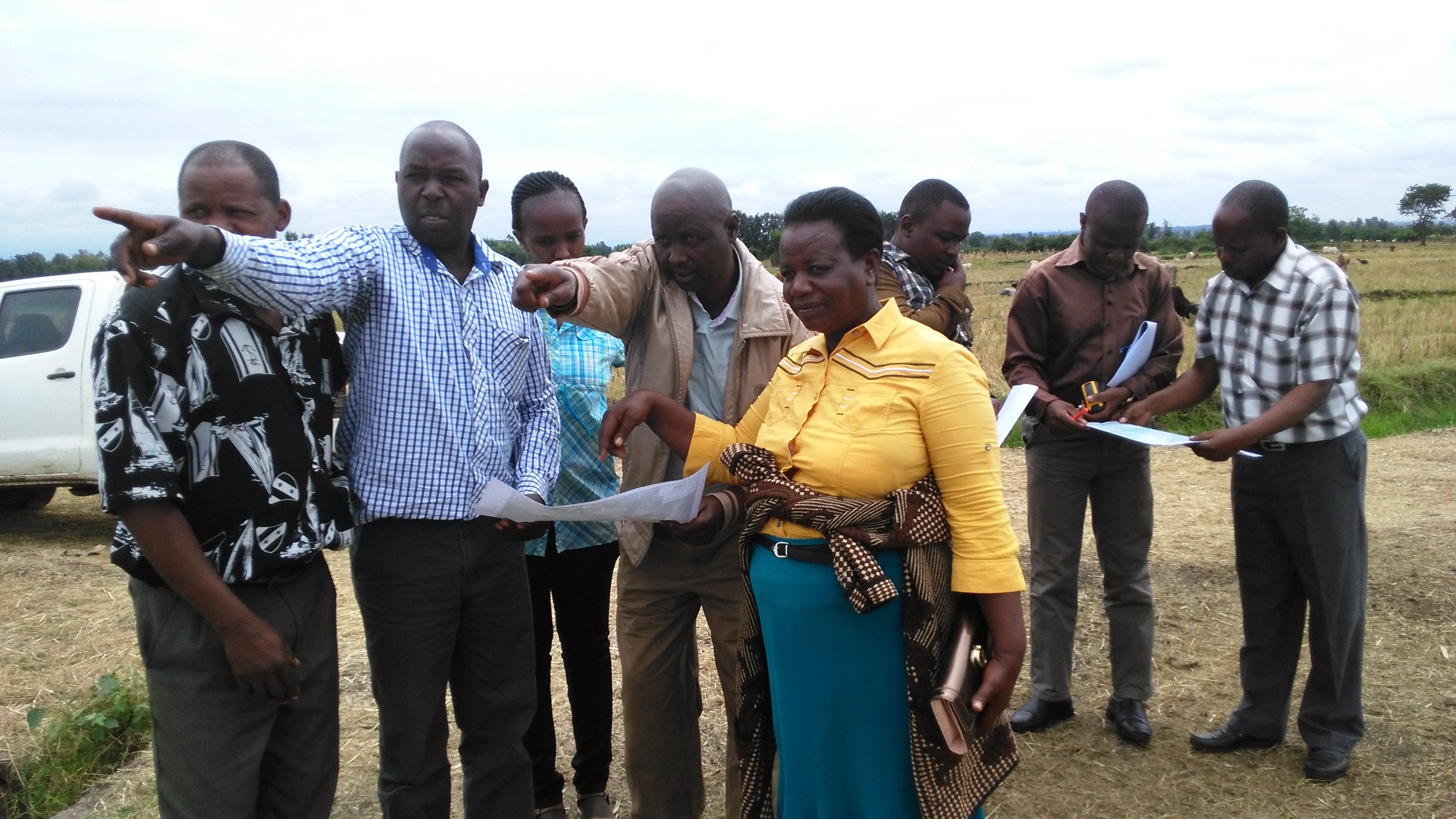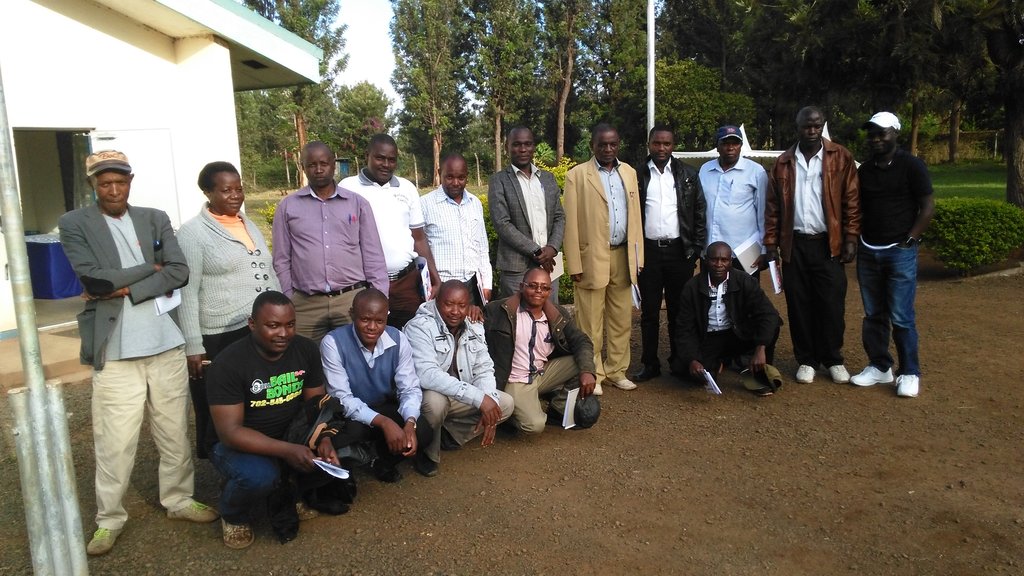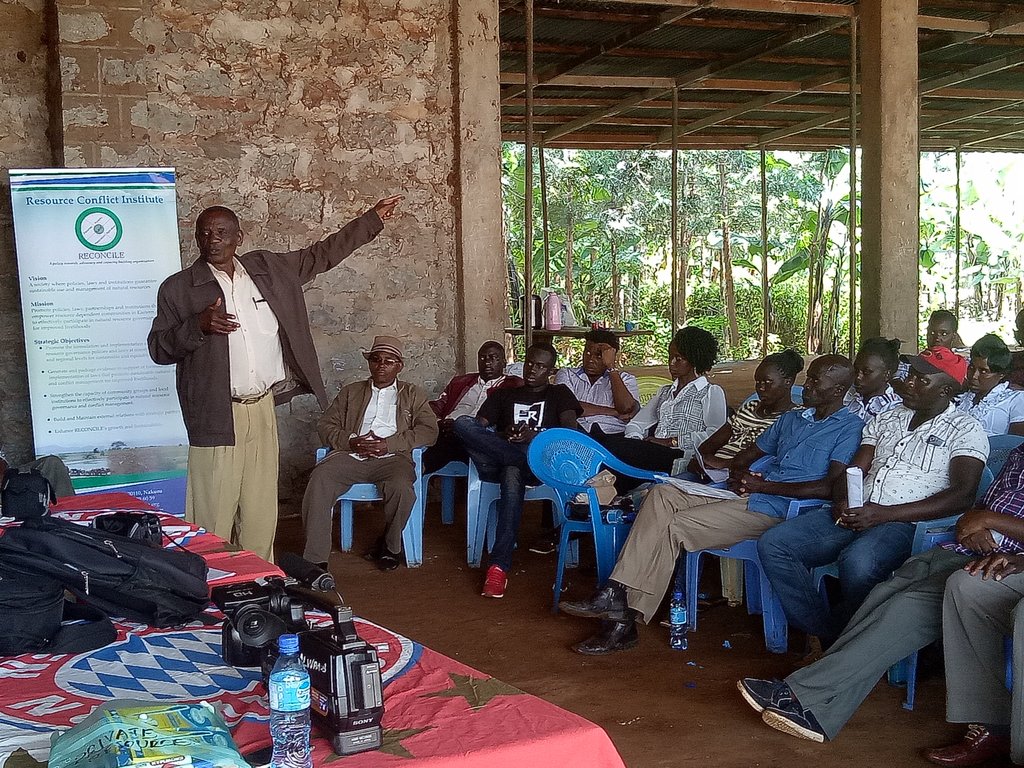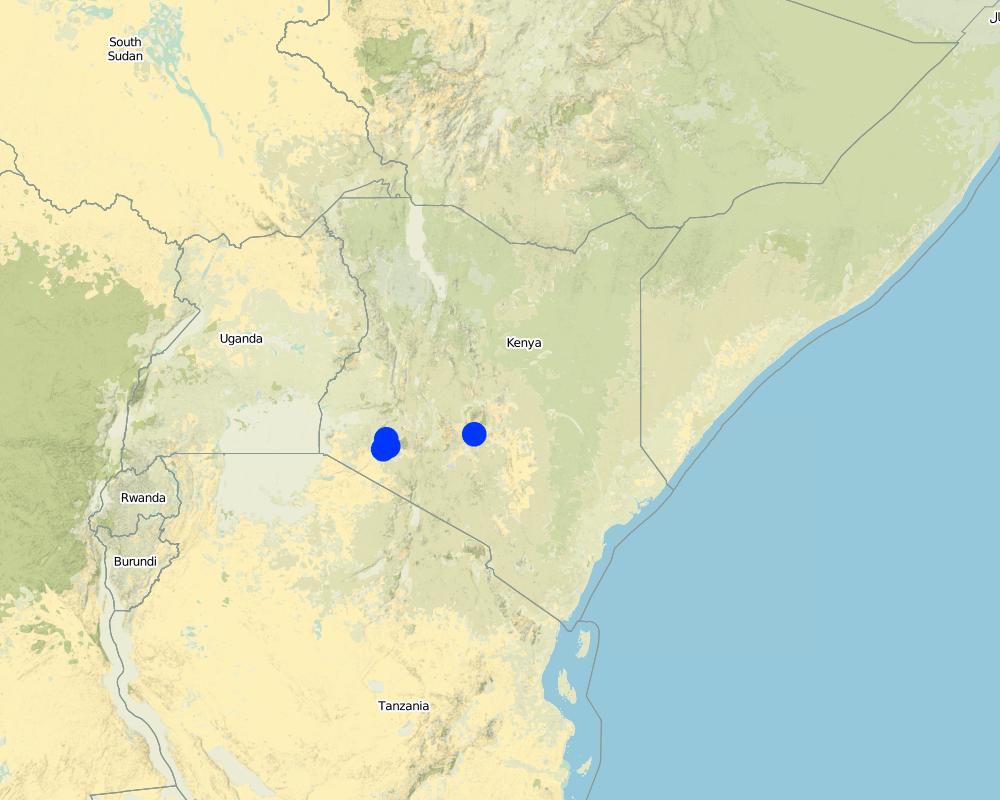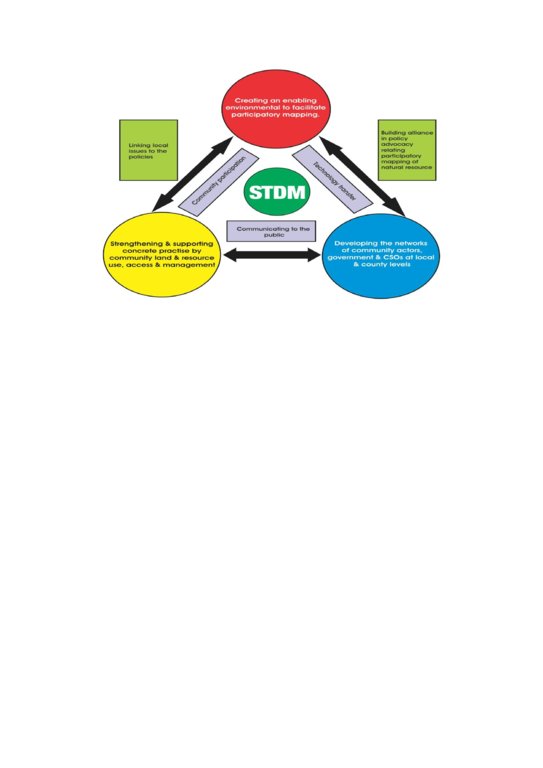Participatory Community Resource Mapping using the Social Tenure Domain Model (STDM) [เคนยา]
- ผู้สร้างสรรค์:
- การอัพเดท:
- ผู้รวบรวม: Ken Otieno
- ผู้เรียบเรียง: –
- ผู้ตรวจสอบ: Rima Mekdaschi Studer, Donia Mühlematter
STDM Project
approaches_3379 - เคนยา
- บทสรุปทั้งหมดในรูปแบบของ PDF
- บทสรุปทั้งหมดในรูปแบบของ PDF เพื่อพิมพ์
- บทสรุปทั้งหมดในรูปหน้าเว็บ
- บทสรุปทั้งหมด (ไม่มีการจัดเรียง)
- Participatory Community Resource Mapping using Social Tenure Domain Model (STDM): 5 มีนาคม 2018 (inactive)
- Participatory Community Resource Mapping using the Social Tenure Domain Model (STDM): 19 พฤษภาคม 2018 (inactive)
- Participatory Community Resource Mapping using the Social Tenure Domain Model (STDM): 4 มิถุนายน 2018 (inactive)
- Participatory Community Resource Mapping using the Social Tenure Domain Model (STDM): 3 กันยายน 2018 (public)
ดูส่วนย่อย
ขยายทั้งหมด ย่อทั้งหมด1. ข้อมูลทั่วไป
1.2 รายละเอียดที่ติดต่อได้ของผู้รวบรวมและองค์กรที่เกี่ยวข้องในการประเมินและการจัดเตรียมทำเอกสารของแนวทาง
วิทยากรหลัก
ผู้เชี่ยวชาญ SLM:
ชื่อของโครงการซึ่งอำนวยความสะดวกในการทำเอกสารหรือการประเมินแนวทาง (ถ้าเกี่ยวข้อง)
Book project: Guidelines to Rangeland Management in Sub-Saharan Africa (Rangeland Management)ชื่อของโครงการซึ่งอำนวยความสะดวกในการทำเอกสารหรือการประเมินแนวทาง (ถ้าเกี่ยวข้อง)
Resource Conflict Institute (RECONCILE) - เคนยา1.3 เงื่อนไขที่เกี่ยวข้องกับการใช้ข้อมูลที่ได้บันทึกไว้ผ่านทาง WOCAT
วันที่เก็บรวบรวมข้อมูล (ภาคสนาม):
04/09/2017
ผู้รวบรวมและวิทยากรหลักยอมรับเงื่อนไขเกี่ยวกับการใช้ข้อมูลที่ถูกบันทึกผ่านทาง WOCAT:
ใช่
2. คำอธิบายของแนวทาง SLM
2.1 การอธิบายแบบสั้น ๆ ของแนวทาง
The Social Tenure Domain Model (STDM) is about people and their relationships with the land. The tool as applied secures tenure through the recognition of tenure diversity and social contexts. STDM recognizes that secure tenure builds confidence among the resource users, and therefore promotes confidence to investment at different levels: small-scale, large-scale, urban and rural investors who all benefits from security of tenure.
2.2 การอธิบายอย่างละเอียดของแนวทาง
การอธิบายอย่างละเอียดของแนวทาง:
The Rangelands Initiative Africa is a programme of the International Land Coalition (ILC) that is working to make rangelands more tenure-secure. The Resource Conflict Institute (RECONCILE) hosts and coordinates the Africa component, while the International Livestock Research Institutre (ILRI) takes global responsibility. It is recognized that the diverse resources and interests of rangelands concern all stakeholders and learning within these groups is important for strategic interventions and responses.
RECONCILE seeks to demonstrate the application of the Social Tenure Domain Model (STDM) in a rural setting, and in this context it has been able to secure social tenure rights for increased production among smallholder farmers. This land management and tenure security programme sought to address the dynamics around common resources in Bomet. Recognizing that there are multiple claims to common resources, the approach focuses on people as the central nexus in land administration. As such, it incorporates an extensive range of systems and processes to manage land through effective and accurate planning and management.
Land - as a factor in production – always attracts interest from various stakeholders. As such, secure access to land, whether through formal, informal, customary or other means, is necessary for rural households to create clarity and security about their rights and to enjoy sustainable livelihoods. In turn this is central to sustainable development. Securing access by rural poor people to land and water rights is key in the reduction of extreme poverty and hunger, since these are crucial assets for poor rural women, youth and men. Kenya has legal, policy and institutional frameworks and governance systems that presents options and opportunities.
The STDM process involves problem identification, stakeholder analysis, training, community enumeration, and data collection. Data includes socio-economic and spatial information. The process allows for a better understanding and testing of the extent that STDM technology responds to gaps and how best it can be applied to cater for the needs of all stakeholders within rural, agricultural, communal land settings. The application of the technology demands complete data sets that are consolidated through a census of both resources users and resources.
2.3 รูปภาพของแนวทาง
2.5 ประเทศ ภูมิภาค หรือสถานที่ตั้งที่ได้นำแนวทางไปใช้
ประเทศ:
เคนยา
ภูมิภาค/รัฐ/จังหวัด: :
Bomet county
ข้อมูลเฉพาะเพิ่มเติมของสถานที่ตั้ง:
Kembu sub-county
ความคิดเห็น:
The project implementation was done in three counties two of which the actual approach applied these are Bomet and Kirinya.
Map
×2.6 วันที่เริ่มต้นและสิ้นสุดของแนวทาง
ระบุปีที่เริ่ม:
2016
ถ้าไม่รู้ปีที่แน่นอนให้ประมาณวันที่ที่ริเริ่มใช้แนวทางนี้ :
น้อยกว่า 10 ปี (เร็วๆนี้)
การสิ้นสุดลง (ถ้าแนวทางไม่ได้ใช้อีกต่อไป):
2017
ความคิดเห็น:
Even though the project ended with the contract with the UNHABITAT, RECONCILE is still progressing with the approach in other areas
2.7 ประเภทของแนวทาง
- ใช้โครงงานหรือแผนงานเป็นฐาน
2.8 เป้าหมายหรือวัตถุประสงค์หลักของแนวทาง
- Improve production
- Reduce, prevent, restore land degradation
- Conserve ecosystem
- Protect a watershed/ downstream areas
2.9 เงื่อนไขที่เอื้ออำนวยหรือเป็นอุปสรรคต่อการนำเทคโนโลยีภายใต้แนวทางนี้ไปปฏิบัติใช้
บรรทัดฐานและค่านิยมทางสังคม วัฒนธรรม ศาสนา
- เอื้ออำนวย
The approach is participatory and the communities consent to the process taking leadership as such it is an enabler.
การมีไว้ให้หรือการเข้าถึงแหล่งการเงินและบริการ
- เอื้ออำนวย
Based on secure tenure rights, and thus enhanced confidence, the communities increase their investments and as a result increase income.
การจัดตั้งระดับองค์กร
- เอื้ออำนวย
The approach is engaging and therefore flexible to inclusion of different institutions including government and the private sector.
การร่วมมือหรือการทำงานประสานกันของผู้ลงมือปฏิบัติ
- เอื้ออำนวย
Promotes partnership and collaboration
กรอบแนวทางในการดำเนินการด้านกฎหมาย (การถือครองที่ดิน สิทธิในการใช้ที่ดินและน้ำ)
- เอื้ออำนวย
Strengthens such frameworks as participatory resource securing process that reinforces accountability and services delivery. It recognizes multiple tenure and resource rights
นโยบาย
- เอื้ออำนวย
The STDM process is compatible with diverse policy frameworks that support the use and management of communal resources.
การกำกับดูแลที่ดิน (การตัดสินใจ การนำเอาไปปฏิบัติใช้ และการบังคับใช้)
- เป็นอุปสรรค
In circumstances where land governance is not well defined, the process posses challenges and sometimes expectations and or lack of it undermines the process
3. การมีส่วนร่วมและบทบาทของผู้มีส่วนได้ส่วนเสียที่เกี่ยวข้อง
3.1 ผู้มีส่วนได้ส่วนเสียที่เกี่ยวข้องในแนวทางนี้และบทบาท
- ผู้ใช้ที่ดินระดับท้องถิ่นหรือชุมชนระดับท้องถิ่น
Small holder dairy farmers.
Land users and community members were key players in data collection, and were the users of the approach and technology.
- ผู้เชี่ยวชาญ SLM หรือที่ปรึกษาการเกษตร
GIS specialists, Lawyers, development experts.
Provided skills and expertise.
- องค์กรพัฒนาเอกชน
Technical University of Kenya, Regional Centre for Mapping Resources for Development, Pamoja Trust.
All these institutions had a role in the project based on their previous engagement with UNHABITAT.
ถ้ามีผู้มีส่วนได้ส่วนเสียหลายคนที่เกี่ยวข้องให้ระบุหน่วยงานตัวแทน:
RECONCILE was the lead
3.2 การเกี่ยวข้องของผู้ใช้ที่ดินระดับท้องถิ่นหรือชุมชนระดับท้องถิ่นในช่วงต่างๆของแนวทาง
| ความเกี่ยวข้องของผู้ใช้ที่ดินระดับท้องถิ่นหรือชุมชนระดับท้องถิ่น | ระบุผู้ที่มีส่วนเกี่ยวข้องและอธิบายกิจกรรม | |
|---|---|---|
| การริเริ่มหรือการจูงใจ | ปฏิสัมพันธ์ | The communities internalized the process and as such were very engaging and even self-mobilized themselves for the tasks. |
| การวางแผน | ปฏิสัมพันธ์ | Same as above |
| การดำเนินการ | ปฏิสัมพันธ์ | These were the key people in all the process of resource identification mapping and protection of both communal and private resources, both identified and mapped. |
| การติดตามตรวจสอบหรือการประเมินผล | ระดมกำลังด้วยตนเอง | They still follow and report on the current status. |
3.3 แผนผังแสดงขั้นตอนการทำงาน (ถ้ามี)
คำอธิบาย:
Using technology to enhance production among farmers need well thought-through approaches -Recognize diverse dynamics -Manage expectations
ผู้เขียน:
Ken Otieno
3.4 การตัดสินใจเลือกใช้เทคโนโลยี SLM
ระบุผู้ที่ทำการตัดสินใจเลือกเทคโนโลยีมากกว่าหนึ่งวิธีไปปฏิบัติใช้:
- ผู้ลงมือปฏิบัติที่เกี่ยวข้องทั้งหมดในฐานะที่เป็นส่วนรวมของแนวทาง
ระบุว่าการตัดสินใจตั้งอยู่บนพื้นฐานของ:
- สิ่งที่ค้นพบจากงานวิจัย
4. การสนับสนุนด้านเทคนิค การสร้างขีดความสามารถ และการจัดการด้านความรู้
4.1 การสร้างขีดความสามารถ / การอบรม
ได้มีการจัดอบรมให้แก่ผู้ใช้ที่ดินหรือผู้มีส่วนได้ส่วนเสียคนอื่น ๆ หรือไม่:
ใช่
ให้ระบุว่าใครเป็นผู้ได้รับการอบรม:
- ผู้ใช้ที่ดิน
- เจ้าหน้าที่ภาคสนาม / ที่ปรึกษา
รูปแบบการอบรม:
- กำลังดำเนินการ
- เกษตรกรกับเกษตรกร
- จัดการประชุมสู่สาธารณชน
4.2 การบริการให้คำแนะนำ
ผู้ใช้ที่ดินมีการเข้าถึงการรับบริการให้คำปรึกษาหรือไม่:
ใช่
ระบุว่ามีบริการให้คำปรึกษาหรือไม่:
- ไปเยี่ยมชมสถานที่
- ที่ศูนย์ถาวร
การอธิบาย/แสดงความคิดเห็น:
The users are beneficiaries of a government programme in the areas where the approach was tested.
4.3 การเสริมความแข็งแกร่งให้กับสถาบัน (การพัฒนาองค์กร)
สถาบันได้รับการจัดตั้งขึ้นมาหรือเสริมความแข็งแกร่งโดยแนวทางนี้หรือไม่:
- ใช่ อย่างมาก
ระบุระดับของสถาบันที่ได้รับการเสริมความแข็งแกร่งหรือจัดตั้งขึ้นมา:
- ท้องถิ่น
ระบุประเภทของการให้ความช่วยเหลือสนับสนุน:
- การสร้างขีดความสามารถ / การอบรม
- อุปกรณ์
4.4 การติดตามตรวจสอบและประเมินผล
การติดตามตรวจสอบและประเมินผลเป็นส่วนหนึ่งของแนวทางหรือไม่:
ใช่
ถ้าตอบว่าใช่ แสดงว่าการจัดเตรียมเอกสารนี้มุ่งหวังที่จะเอาไปใช้สำหรับการติดตามตรวจสอบและประเมินผลใช่หรือไม่:
ไม่ใช่
4.5 การวิจัย
การวิจัยเป็นส่วนหนึ่งของแนวทางหรือไม่:
ไม่ใช่
5. การสนับสนุนด้านการเงินและวัสดุอุปกรณ์
5.1 ระบุงบประมาณประจำปีสำหรับแนวทาง SLM นี้
ถ้าหากว่างบประมาณประจำปีไม่เป็นที่ทราบแน่นอน ให้ระบุช่วงลงไป:
- 10,000-100,000
5.2 การสนับสนุนด้านการเงิน / วัสดุอุปกรณ์ให้แก่ผู้ใช้ที่ดิน
ผู้ใช้ที่ดินได้รับการสนับสนุนด้านการเงิน / วัสดุอุปกรณ์ไปปฏิบัติใช้เทคโนโลยีหรือไม่:
ไม่ใช่
5.3 เงินสนับสนุนสำหรับปัจจัยนำเข้า (รวมถึงแรงงาน)
- ไม่มี
ถ้าแรงงานโดยผู้ใช้ที่ดินเป็นปัจจัยนำเข้าที่มีอยู่มากมาย ระบุด้วยว่าเนื่องจาก:
- สมัครใจ
5.4 เครดิต
มีการจัดหาเครดิตมาให้ภายใต้แนวทาง SLM หรือไม่:
ไม่ใช่
5.5 แรงจูงใจหรือเครื่องมืออื่น ๆ
แรงจูงใจหรือเครื่องมืออื่น ๆ ได้ถูกนำไปใช้ส่งเสริมการใช้เทคโนโลยี SLM หรือไม่:
ไม่ใช่
6. การวิเคราะห์ผลกระทบและการสรุป
6.1 ผลกระทบของแนวทาง
ทำให้ผู้ใช้ที่ดินระดับท้องถิ่นมีอำนาจขึ้น ปรับปรุงการเข้าร่วมของผู้มีส่วนได้ส่วนเสียให้ดีขึ้นหรือไม่:
- ไม่ใช่
- ใช่ เล็กน้อย
- ใช่ ปานกลาง
- ใช่ อย่างมาก
Communities and the programme benefited and revamped resource management committees.
ช่วยในการตัดสินใจโดยดูจากหลักฐาน ได้หรือไม่:
- ไม่ใช่
- ใช่ เล็กน้อย
- ใช่ ปานกลาง
- ใช่ อย่างมาก
The county governments greatly recognizes and appreciates the technology and approach to the extent that they will use the information and date in planning and resources allocation.
ช่วยให้ผู้ใช้ที่ดินนำเอาเทคโนโลยี SLMไปใช้และบำรุงรักษาสภาพไว้ได้หรือไม่:
- ไม่ใช่
- ใช่ เล็กน้อย
- ใช่ ปานกลาง
- ใช่ อย่างมาก
Yes, the fact that the programme used local land users as key experts in the actual work has secured local resources.
ปรับปรุงความร่วมมือกันและการดำเนิน งานของ SLM ได้อย่างมีประสิทธิผลหรือไม่:
- ไม่ใช่
- ใช่ เล็กน้อย
- ใช่ ปานกลาง
- ใช่ อย่างมาก
The partnership between and among government institutions has increased.
ระดมกำลังหรือปรับปรุงการเข้าถึงแหล่ง เงินทุนสำหรับการดำเนินการ SLM หรือไม่:
- ไม่ใช่
- ใช่ เล็กน้อย
- ใช่ ปานกลาง
- ใช่ อย่างมาก
The concept of the bigger programme was to support milk bulking and this has been achieved through improved resources use and management which in turn has enhanced milk produce; volume and quality.
ปรับปรุงความรู้และความสามารถของผู้ใช้ที่ดินในการดำเนินการ SLM หรือไม่:
- ไม่ใช่
- ใช่ เล็กน้อย
- ใช่ ปานกลาง
- ใช่ อย่างมาก
To the extent that the community resource users are directly involved in resource use and management, knowledge and skills are enhanced due to exposure and interactive sessions.
ปรับปรุงความรู้และความสามารถของผู้มีส่วนได้ส่วนเสียคนอื่น ๆ ให้ดีขึ้นหรือไม่:
- ไม่ใช่
- ใช่ เล็กน้อย
- ใช่ ปานกลาง
- ใช่ อย่างมาก
The application of skills by local people influenced the thinking.
Partnership and collaborations developed
ช่วยบรรเทาความขัดแย้งหรือไม่:
- ไม่ใช่
- ใช่ เล็กน้อย
- ใช่ ปานกลาง
- ใช่ อย่างมาก
It was not the main objective, however.
ทำให้กลุ่มด้อยโอกาสมีอำนาจทางสังคมและเศรษฐกิจหรือไม่:
- ไม่ใช่
- ใช่ เล็กน้อย
- ใช่ ปานกลาง
- ใช่ อย่างมาก
They were not targeted directly but benefited from the wider community scope.
ปรับปรุงความทัดเทียมกันด้านเพศและให้อำนาจแก่ผู้หญิงและเด็กผู้หญิงหรือไม่:
- ไม่ใช่
- ใช่ เล็กน้อย
- ใช่ ปานกลาง
- ใช่ อย่างมาก
Both men and women were equally involved in the process.
ส่งเสริมให้เยาวชนหรือบุตรหลานของผู้ใช้ที่ดินให้เข้าร่วมใน SLM:
- ไม่ใช่
- ใช่ เล็กน้อย
- ใช่ ปานกลาง
- ใช่ อย่างมาก
The use if GPS was and incentive.
ปรับปรุงประเด็นของการถือครองที่ดินหรือสิทธิในการใช้ ซึ่งขัดขวางการนำเทคโนโลยีไปใช้ให้ดีขึ้น:
- ไม่ใช่
- ใช่ เล็กน้อย
- ใช่ ปานกลาง
- ใช่ อย่างมาก
The approach does not explicitly engage in issues of tenure but, implementation awareness is created.
นำไปสู่ความมั่นคงด้านอาหารหรือปรับปรุงโภชนาการให้ดีขึ้น:
- ไม่ใช่
- ใช่ เล็กน้อย
- ใช่ ปานกลาง
- ใช่ อย่างมาก
This can be acknowledged to some degree but needs verification through a study
ปรับปรุงการเข้าถึงตลาดหรือไม่:
- ไม่ใช่
- ใช่ เล็กน้อย
- ใช่ ปานกลาง
- ใช่ อย่างมาก
Was not a direct concern but yes, it did based on more milk production.
นำไปสู่การเข้าถึงเรื่องน้ำและสุขาภิบาลได้ดีขึ้นหรือไม่:
- ไม่ใช่
- ใช่ เล็กน้อย
- ใช่ ปานกลาง
- ใช่ อย่างมาก
Yes clean water.
นำไปสู่การใช้ที่ดินอย่างยั่งยืนหรือแหล่งพลังงานหรือไม่:
- ไม่ใช่
- ใช่ เล็กน้อย
- ใช่ ปานกลาง
- ใช่ อย่างมาก
By enhanced use of biogas.
ปรับปรุงความสามารถของผู้ใช้ที่ดินในการปรับตัวให้เข้ากับการเปลี่ยนแปลงของสภาพภูมิอากาศหรือสภาพที่รุนแรงและภัยพิบัติหรือไม่:
- ไม่ใช่
- ใช่ เล็กน้อย
- ใช่ ปานกลาง
- ใช่ อย่างมาก
นำไปสู่โอกาสในการจ้างงาน รายได้หรือไม่:
- ไม่ใช่
- ใช่ เล็กน้อย
- ใช่ ปานกลาง
- ใช่ อย่างมาก
6.2 แรงจูงใจหลักของผู้ใช้ที่ดินเพื่อที่จะนำ SLM ไปปฏิบัติใช้
- การผลิตที่เพิ่มขึ้น
6.3 ความยั่งยืนของกิจกรรมของแนวทาง
ผู้ใช้ที่ดินสามารถทำให้สิ่งต่างๆ ที่ได้ปฏิบัติใช้โดยแนวทางนี้ยั่งยืนได้หรือไม่ (โดยไม่มีการสนับสนุนจากภายนอก):
- ใช่
ถ้าตอบว่าใช่ ให้อธิบายว่าอย่างไร :
The approach did not confer any material gains or incentives, but the process was community-centred, thus adopted.
6.4 จุดแข็งและข้อได้เปรียบของแนวทาง
| จุดแข็ง / ข้อได้เปรียบของแนวทางในทัศนคติของผู้ใช้ที่ดิน |
|---|
|
The approach targeted identified problems that were felt by the actors/ implementer and communities in a joint mission. The approach demonstrated the capability to map livelihood resources of the rangeland users, including those associated with milk production such as milk coolers, water points, cattle dips, food stores, grazing areas, salt licks, crush, animal corridors, forest etc |
|
Collectively, communities were able to understand the management status of communally shared resources and responsible persons. Establishment of the land tenure system of shared communal resources and issues arising. Status of private resources within the rangelands. |
| จุดแข็ง / ข้อได้เปรียบของแนวทางในทัศนคติของผู้รวบรวมหรือวิทยากรหลัก |
|---|
| The approach uses a participatory approach, hence builds community ownership. |
|
The mix of the approach bridges the gap through skills transfer and capacity building, and in facilitating dialogue on issues affecting the community (through maps, reports). The process though technical, can be simplified, and because users can relate to, and find value in, it contributed to its immense success. |
|
The STDM database accommodates inclusion of social, economic and spatial data that can be maintained, accessed and updated by the communities anytime. It provided a visual representation of available resources and their distribution, and people can relate to spatial information on the map. |
| Ownership of the technology by local people is important: they are now leading on data collection, customizing the template, developing reports and innovating on its use. |
6.5 จุดอ่อน / ข้อเสียเปรียบของแนวทางและวิธีในการแก้ไข
| จุดอ่อน / ข้อเสียเปรียบในทัศนคติของผู้ใช้ที่ดิน | สามารถแก้ไขปัญหาได้อย่างไร |
|---|---|
| The design of the tool was a more urban oriented and took time to be adopted for rural use especially where land is communal and customs are key. | Created more awareness. |
| จุดอ่อน / ข้อเสียเปรียบในทัศนคติของผู้รวบรวมหรือวิทยากรหลัก | สามารถแก้ไขปัญหาได้อย่างไร |
|---|---|
|
Difficult to set-up the server environment where no internet is available. Engaging other service providers may be difficult and takes time (Internet service providers need to authorize setting-up an additional server). Appropriate devices for capturing data may necessitate an additional budget. |
The internet component remains a challenge. Technology is evolving and needs systematic information channels. The process requires proper funding in order to continue without interruption. |
7. การอ้างอิงและการเชื่อมต่อ
7.1 วิธีการหรือแหล่งข้อมูล
- ไปเยี่ยมชมภาคสนาม การสำรวจพื้นที่ภาคสนาม
900
- การสัมภาษณ์กับผู้ใช้ที่ดิน
900
- การสัมภาษณ์ผู้เชี่ยวชาญด้าน SLM หรือผู้ชำนาญ
2
- การเก็บรวบรวมมาจากรายงานและเอกสารที่มีอยู่
7.3 เชื่อมโยงกับข้อมูลที่มีอยู่บนออนไลน์
ชื่อเรื่องหรือคำอธิบาย:
RECONCILE end of project report and other progress reports are available for sharing
ชื่อเรื่องหรือคำอธิบาย:
Food security in Bomet county
URL:
awsc.uonbi.ac.ke/sites/default/files/chss/arts/.../Bomet-final.doc
ลิงก์และโมดูล
ขยายทั้งหมด ย่อทั้งหมดลิงก์
ไม่มีลิงก์
โมดูล
ไม่มีโมดูล


